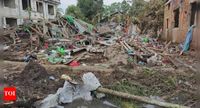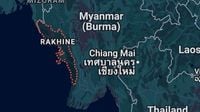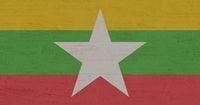In the early hours of September 13, 2025, tragedy struck the heart of western Myanmar’s Rakhine state when an airstrike targeted two private high schools in Kyauktaw township. According to multiple reports from international agencies and Myanmar-based sources, at least 19 high school students—aged between 15 and 21—lost their lives, while 22 others were left wounded. The attack, which occurred just after midnight as students slept, has been widely condemned and is being described as a stark example of the escalating violence that has gripped the region since the military coup in 2021.
The Arakan Army (AA), an ethnic minority armed group locked in fierce combat with Myanmar’s ruling military junta, was quick to issue a statement blaming the junta for the deadly strike. “We feel as sad as the victims’ families for the death of the innocent students,” the AA declared, as quoted by AFP and other outlets. The group’s statement, posted on Telegram, underscored the devastating human toll of the ongoing conflict and the sense of collective mourning gripping the community.
Local media, including Myanmar Now, provided harrowing details of the attack, reporting that a junta warplane dropped two 500-pound bombs on the schools while the students were asleep. The carnage unfolded in Thayat Tabin village, within AA-controlled Kyauktaw township, an area that has seen intense fighting as the AA has seized significant territory over the past year.
The United Nations children’s agency, UNICEF, was unequivocal in its condemnation, calling the incident a “brutal attack” and warning that it forms part of a “pattern of increasingly devastating violence in Rakhine State, with children and families paying the ultimate price.” The agency’s statement, echoed by UN News, drew attention to the recurring use of air and artillery strikes against civilian populations in Myanmar’s conflict zones—a tactic that has been repeatedly documented since the military seized power in 2021.
Communication with the affected area remains limited, as patchy internet and phone access have made it difficult for journalists and aid agencies to reach survivors or verify the full extent of the devastation. AFP noted that its calls to the junta’s spokesman for comment went unanswered, and that attempts to contact people on the ground around Kyauktaw were hampered by the region’s unreliable connectivity.
This airstrike is not an isolated incident but rather the latest chapter in a broader saga of violence and upheaval that has engulfed Myanmar since the military ousted Aung San Suu Kyi’s elected civilian government in a February 2021 coup. The coup, justified by the military with unproven claims of electoral fraud, sparked widespread armed resistance and plunged the country into a protracted civil conflict. The AA’s struggle for control of Rakhine state is just one front in a nationwide struggle that has left millions displaced and countless families mourning lost loved ones.
According to the head of the UN refugee agency, Filippo Grandi, who visited Myanmar earlier this week, “the suffering of millions of people across Myanmar is immense.” He went on to describe a country where “aerial bombardments, destruction of property, and forced recruitment” have become daily realities, leaving men, women, and children living “in daily fear for their lives.” Grandi’s plea was clear: “Civilian men, women and children must be protected from violence, and solutions found so that they can choose to return home in safety and dignity.”
Amid the ongoing violence, Myanmar’s military junta has announced plans to hold phased national elections starting December 28, 2025, with results expected by the end of January next year. Junta officials claim the elections could pave the way toward peace, but many in the international community remain skeptical, given the military’s track record and the continued exclusion of opposition groups. The elections are set to unfold against a backdrop of armed clashes, displacement, and widespread distrust—a far cry from the stability and inclusiveness that many in Myanmar had hoped for prior to the 2021 coup.
The airstrike in Kyauktaw township is emblematic of the broader chaos that has engulfed the country. The AA’s campaign against the military junta has intensified in recent months, with the group capturing swathes of territory in Rakhine and refusing to back down despite the junta’s superior firepower. The military, for its part, has relied increasingly on air and artillery strikes to try to suppress resistance, with civilians often caught in the crossfire.
In March 2025, Myanmar was also rocked by a 7.7 magnitude earthquake that affected multiple regions, including the capital Nay Pyi Taw. The natural disaster compounded the misery of a population already battered by conflict, displacement, and economic hardship. Relief efforts have been hampered by the ongoing violence and the junta’s tight control over aid distribution, leaving many communities in desperate need of support.
For families in Kyauktaw and across Rakhine state, the trauma of losing children to an airstrike while they slept in their school dormitories is almost unimaginable. The AA’s statement captured the sense of collective grief: “We feel as sad as the victims’ families for the death of the innocent students.” UNICEF’s condemnation, too, was unequivocal: “This adds to a pattern of increasingly devastating violence in Rakhine State, with children and families paying the ultimate price.”
Despite the mounting toll, the junta has so far remained silent on the Kyauktaw airstrike, declining to respond to media inquiries or acknowledge responsibility. The lack of official comment has only deepened the anger and frustration among Rakhine’s residents and ethnic minority groups, who see the attack as yet another example of the military’s disregard for civilian lives.
Myanmar’s ongoing crisis has drawn international condemnation and calls for accountability, but concrete action remains elusive. As the country lurches toward the planned elections, many observers fear that the violence will only intensify, with civilians—especially children—bearing the brunt of the conflict. The events in Kyauktaw serve as a grim reminder of the urgent need for a peaceful resolution and for the protection of those most vulnerable.
As the world watches, the people of Rakhine and the wider Myanmar community continue to endure unimaginable hardship, hoping for a day when schools are places of learning, not targets of warplanes. For now, the scars of September 13 linger, a testament to the high price of conflict and the resilience of those who survive it.






